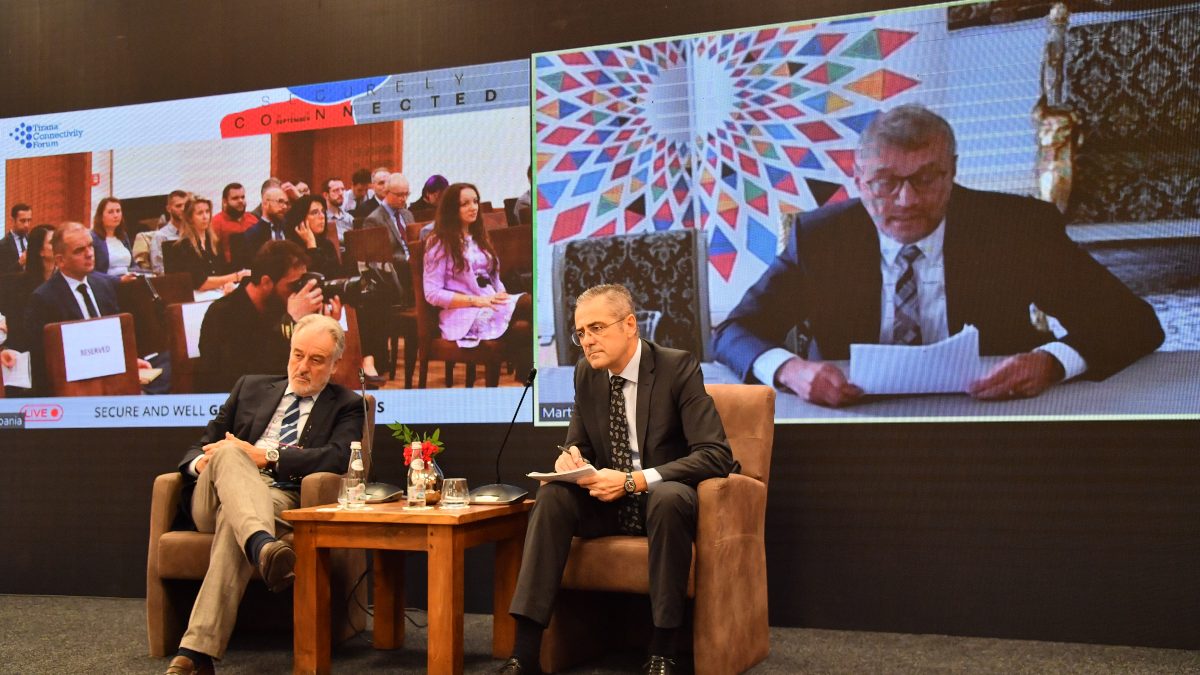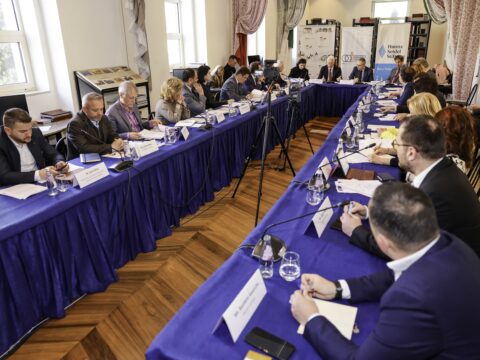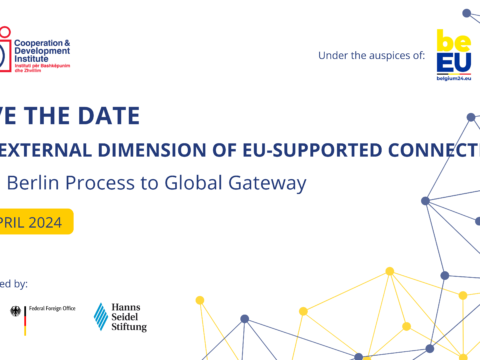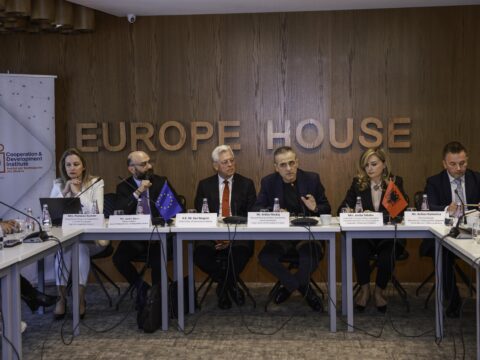Czech EU Presidency to help promote the proposals or recommendations – on connectivity infrastructure, energy security and institutional resilience – formulated at the TCF22

Securely Connected through Secure and Future-proof Enlargement: Main Highlights of Day 3 of TCF22
October 1, 2022
Tirana Connectivity Forum 2022 Recommendations to Czech Presidency of the EU Council
October 6, 2022Read the full Keynote Address at TCF22 of Mr Martin Dvorak, Deputy Minister of Foreign Affairs of the Czech Republic.
- It is a pleasure and honor to have the opportunity to speak on behalf of the Ministry of Foreign Affairs of the Czech Republic and the Czech EU Presidency at the 2022 edition of the Tirana Connectivity Forum.
- Prior to speaking here today, when I thought about what connectivity means for the region, the first thing that came to my mind were the images of the Old Bridge in Mostar, the Mehmed Paša Sokolović Bridge in Višegrad, the Stone Bridge in Skopje, and many other beautiful bridges across the Balkans. These old bridges testify to the eternal human desire to connect and be connected.
- There are times when people forget the benefits of being connected and due to quarrels and conflicts they destroy both physical and imaginary bridges between them. Rebuilding them takes time and effort but it is always worth it.
- Central Europe has had some traumatic experiences of being divided between the East and the West. For decades, the Iron Curtain ran through this part of Europe and separated the Poles, Czechs, Slovaks or Hungarians from the Germans, Austrians and other neighbors. The separation of two Germanies was particularly painful.
- When the Cold War ended, we finally had the opportunity to tear down the barriers and rebuild the lost connectivity. It has to be said that eliminating physical barriers can be a pretty quick process but establishing true connectivity is a much more challenging endeavor that can take decades.
- The real progress in reconnecting with our neighbors took place in connection with the EU integration process. Becoming an EU member state has shown us how important connectivity is for the project of European integration.
- The Wester Balkans is another region that has endured difficult times, including destructive wars. Relations between countries and ethnic groups have been spoiled and the process of their rebuilding has not always been easy.
- All the countries of the region have the goal of joining the EU that is a unique integration and peace project. Their involvement in the enlargement process means that they are interested in comprehensive integration aided by solid connectivity.
- The EU and its member states have been assisting the Western Balkan partners in improving connectivity through numerous projects and initiatives. The region itself has also been active and has made strides in this regard. No one can overlook the tangible progress made due to the support of the European Commission, the Southeast European Cooperation Process, the Regional Cooperation Council, the Berlin Process as well as many other international and regional organizations, institutions, and formats that foster inclusive regional cooperation and enable smoother integration into the EU.
- Today, after confronting new challenges such as the COVID-19 pandemic or the fallout of the Russian attack on Ukraine, we see that investments in the connectivity infrastructure, especially in the area of energy, transportation, and digitalization, are crucial for creating resiliency.
- We have to rethink the way we are connected to reduce our dependencies and vulnerabilities. We have to do this together, the current and future EU member states together.
- That is why the Czech EU Presidency deeply understands the need to proceed with the EU enlargement process and involve the Western Balkan countries as much as possible in the formulation of policies that will determine our future fortunes.
- Therefore, we are very pleased that the first intergovernmental conferences of the accession negotiations with North Macedonia and Albania were held in July.
- We are committed to facilitating a positive decision on visa liberalization with Kosovo in the EU Council by the end of the year. The ability to travel freely is an essential element of connectivity and that’s why we will do our best to succeed.
- We will work on the issue of granting candidate status to Bosnia and Herzegovina which would be an important signal for the country and the whole region.
- Our aim is also to hold, if possible, intergovernmental conferences with Montenegro, Serbia, North Macedonia, and Albania by the end of the year.
- Maintaining the EU-Western Balkans high-level dialogue is clearly needed in these times when Europe is encountering geopolitical turbulences that are causing difficulties in many areas, including energy supply. In this context, I take the opportunity to assure you of the Czech EU Presidency’s commitment to involving the Western Balkan countries in EU discussions on solutions to the acute energy crisis.
- For example, we have promptly shared the relevant information about the September 9 emergency meeting of the Energy Council in Brussels with our Western Balkan partners.
- We will invite the Western Balkan countries to the informal meeting of the Energy Council in Prague on October 12, as well as to other working-level meetings and conferences dealing with the issue of energy supply.
- Besides the energy security challenges we are facing, we must not forget some other key principles for building healthy democratic societies capable of successfully integrating into the EU family.
- At this very time, it is increasingly evident that the integrity and resilience of democratic institutions as well as adherence to a set of shared values are becoming more important than ever.
- The governments in the region will not be able to make their countries part of the successful EU or NATO integration projects if they do not demonstrate the commitment to democracy by reinforcing the democratic institutions and providing room to the involvement of civil society.
- The Czechs have had a very positive experience with civil society and we understand the need for its involvement in public affairs.
- We are trying to reflect this understanding of the importance of civil society in assisting the vital processes in any country throughout our EU Presidency.
- Only 10 days ago, I took part in a civil society conference on youth policy in the Western Balkans that was held in Prague. Just before that, the Czech EU Presidency organized a civil society round table on the challenges of EU integration, building democratic institutions, the rule of law, and reconciliation. In late November, we will host another event focused on the role of education in overcoming the past and reinforcing the democratic institutions.
- It is clear that the topics of connectivity infrastructure, energy security, and institutional resilience are extremely significant in light of the current geopolitical turbulences and that regional solutions need to be discussed. The value of the Tirana Connectivity Forum is that the discussions on these vital issues are held with civil society actors thus dramatically increasing the likelihood that the proposed solutions will be suitable, sustainable, and for the benefit of all citizens of the Western Balkan countries.
- Therefore, I wish you all a fruitful discussion and brainstorming. I also take this opportunity to say that following this conference, the Czech EU Presidency will be ready to help promote the proposals or recommendations formulated at the Tirana Connectivity Forum in our talks with the Western Balkan governments as well as in Brussels. Thank you.




